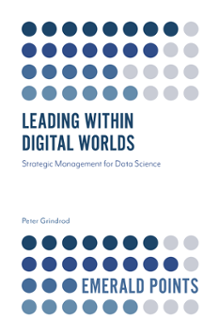
Preface
ISBN: 978-1-83909-809-3, eISBN: 978-1-83909-806-2
Publication date: 18 March 2020
Citation
Grindrod, P. (2020), "Preface", Leading within Digital Worlds, Emerald Publishing Limited, Leeds, pp. 1-3. https://doi.org/10.1108/978-1-83909-806-220201002
Publisher
:Emerald Publishing Limited
Copyright © 2020 Emerald Publishing Limited
Corporate, public sector, and academic institutions increasingly operate within digital worlds, where the mass take-up of digital technologies and the “everything, everywhere, all of the time” expectation of Internet availability is enabling novel products and services, touching almost all aspects of citizens' lives. The rise of all distinct classes of the peer-to-peer activities (social media, messaging, prosumerism) and the rapid growth of online commercial, social, well-being offerings have made a space for the digital economy and digital society that simply did not exist two decades ago.
Not long ago 1 I argued that commercial, public sector, and academic activities really occupy three distinct “spheres”. The “three spheres” model separates out the distinct governing forces for data science, depending on their “sphere”: so, it is really a category error to treat all spheres as similar (especially in policy and regulation). Companies are governed by regulations, their legal contracts with their users/members/customers, and any risks to shareholder value; whereas academics have commitments to responsible research in innovation and are bound by necessary approvals from ethics committees that constrain their activities and publications. Public sector activities are held to a higher security standard, are publicly and politically accountable, and are often focused on joining data assets together.
Despite these differences all of the actors have some obvious things in common. They are employing similar people, skills, concepts, and models; and often over similar types of customer/citizen data. Users cannot easily benchmark or audit these people, groups, processes, or activities: this represents a high-level risk. They are also at the mercy of the sheer pace of change, where the technologies and platforms, and citizens' own behaviors and expectations, make yesterday's offerings obsolete and unappealing. And there are the lurking threats to any present assumptions.
All of this provides a challenge for leaders within these digital worlds. Many of these are generic leadership challenges that are now writ anew in the fast-paced digital spaces; many of these are specific to leading the types of people and teams that institutions increasingly must rely on for mission-critical innovation, research, translation, and the development of distinctive, radical, customer-facing products and services.
This topic is all the more important when individuals have had to grow as leaders, having established themselves in some technical fields. Being a technical leader is one thing – having deep expertise and the respect and esteem of colleagues. Yet being a leader, and landing a strategy, is another level of challenge entirely. Those of us with technical and scientific backgrounds must also be wary of our own comfort zones, into which we love to sink, at the expense of the bigger picture. Meanwhile more and more ventures and institutions must look to their technical teams to innovate and create differentiators. So there is always pressure to perform from every direction: from the board and executives above; from the teams below; and from the customers, competitors, new entrants, partners, and networks, alongside.
Here I attempt to draw together some experience, issues, and advice for those wishing to lead within digital worlds. I have had a variety of career experiences within all three spheres, including founding some successful start-ups within a number of novel (science and data science heavy) commercial sectors; working in R&D with some major corporates; in leading research at the University of Oxford; and in advising some government departments and quangos. Here, we will have a look at a rather wide range of issues to be addressed where rapidly evolving technologies, science, and analytics must intersect with huge shifts within commercial, public, and research visions, missions, demands, and opportunities.
These notes are intended for people with quantitative and scientific backgrounds who find themselves taking on new career leadership positions, and for nontechnical people who seek to create, land, and lead strategies for research, development, and translation, within sectors that are underpinned by scientific, technical, and digital knowledge and innovation.
Peter Grindrod CBE
Oxford, October 2019
P. Grindrod, Beyond privacy and exposure: ethical issues within citizen-facing analytics, Philosphical Transactions of the Royal Society. Series A, 2016.